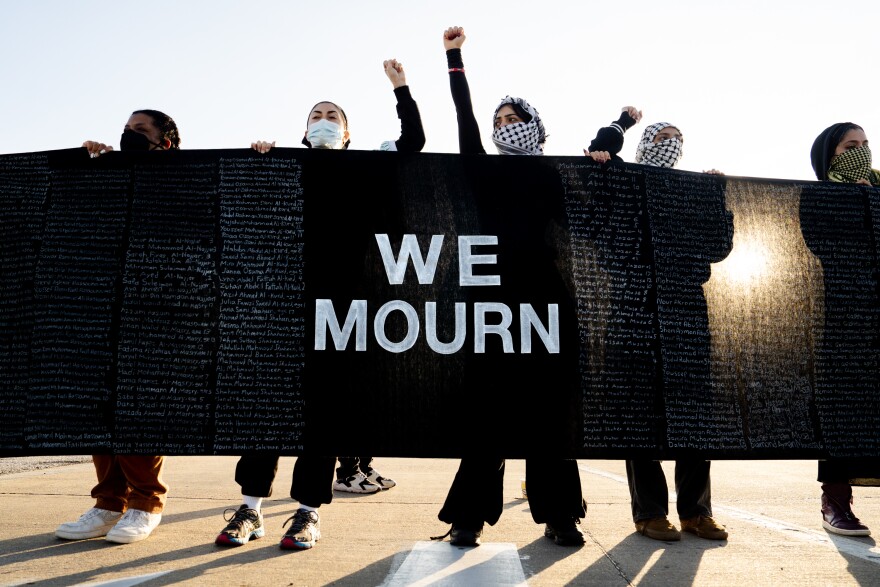ST. CHARLES — Nearly a month after the Israel-Hamas war began, St. Louis-area events supporting Palestinians and Israelis killed or missing in the fighting continue to draw scores of demonstrators and prompt public outcry.
At the most recent of these gatherings, early Monday, about 75 Palestinian supporters rallied in St. Charles to block entrances at a Boeing manufacturing plant that produces weapons the U.S. government has sold to Israel’s military. On Friday, supporters of Israel met in Clayton to emphasize the human toll the nation's people have suffered.
The conflict reached a gruesome milestone this week. According to the Gaza Ministry of Health, the Israel Defense Forces have killed more than 10,000 people in the Gaza Strip, with recent ground attacks and daily bombardments since Oct. 7. That's when Hamas militants attacked several communities in Israel near its border with Gaza, killing 1,400 people and taking 240 hostages.
The scores of civilian deaths have prompted international calls for a cease-fire and locally spurred demonstrators to join public demonstrations.
"What is happening right now in Palestine is not OK," said Mahreen Ansari, a demonstrator from Kansas City, outside the manufacturing plant. "We are trying to prevent workers from going in and making literal bombs that are being used to bomb hospitals, to kill children, to displace and to end bloodlines.”

Boeing won a $2.2 billion contract in 2020 to make small-diameter bombs at the facility. The aerospace and defense manufacturer started developing and building small-diameter bombs for the U.S. Air Force in 2003 and has delivered more than 35,000 to customers, including Israel. The site also manufactures Joint Direct Attack Munition kits, which are mechanisms bolted onto the U.S. military’s general purpose Mark-80-series bomb that turns them into GPS-guided weapons.
Rose Tang, a Chicago-based activist with the antiwar youth group Dissenters, said the coalition of activists from Kansas City, Chicago and St. Louis want to see Congress and President Joe Biden’s administration push for a cease-fire in Gaza. (Israel so far has rejected such calls from other world leaders.)
"Boeing has the blood of 10,000 Palestinians and counting on their hands from just the past month alone,” Tang said. “So we're here to force Boeing employees to confront that and to acknowledge the complicity that they have in the system that is the genocide of Palestinians right now.”
Some motorists who drove by the protest expressed opposition to the action. One driver yelled “You’re supporting terrorists” to the group while a woman passing by yelled “Go to work!” Another man hoisted a cardboard sign with “Boeing Freedom” inked in spray paint as he attempted to rile up protesters. The man, who would not identify himself, said he opposed the protest but declined to speak further to reporters.

The St. Charles facility reopened after more than four hours of demonstrations.
Israel supporters also have held events in recent days to continue bringing attention to the toll their loved ones and community in Israel have faced during the war.
David Palatnik and Dafna Revah, both of Olivette, organized an art installation and public gathering in Shaw Park on Friday to remember the 240 civilians Hamas militants kidnapped on Oct. 7.
Hundreds of people milled quietly around dozens of tables that were set as if for a festive Shabbat meal. The tables were covered in white linen and topped with place settings, plus loaves of challah and individual red roses. But instead of dinner guests, each seat had a flier attached that identified one of the kidnapped individuals.
“It’s so, so important for everyone to come here and ... show support [to] tell all the people in Israel that we love them [and that] we didn’t forget about all these 240-something people that are waiting to have Shabbat as well,” Palatnik said.

Palatnik was born in Israel and keeps in touch regularly with his extended family, who still live there. He said he contacts his mother through a messaging app but has faced challenging feelings as the war rages on.
“It’s difficult because I don’t feel I’m doing enough,” he said. "You live there in the U.S., so you have to keep on going with your life. You have work. You have school. You have everything going on, but you know — it just doesn’t stop.”
Revah cited the rise in worldwide anti-semitism, which has intensified during recent weeks. “It’s truly terrifying,” she said. “I think it’s made everyone think: ‘What do I do every day? What do I want my life to look like? Do I feel safe? Should I wear this Jewish star? Should I keep my mezuzah up?'”
Revah added she is uncertain about what’s to come from the conflict in the Middle East but has found it difficult to stay optimistic. “It just feels like the worst is yet to come,” she said. “I always say, ‘I’m waiting for the next shoe to drop.’”
St. Louis Public Radio’s Lara Hamdan contributed to this report.







